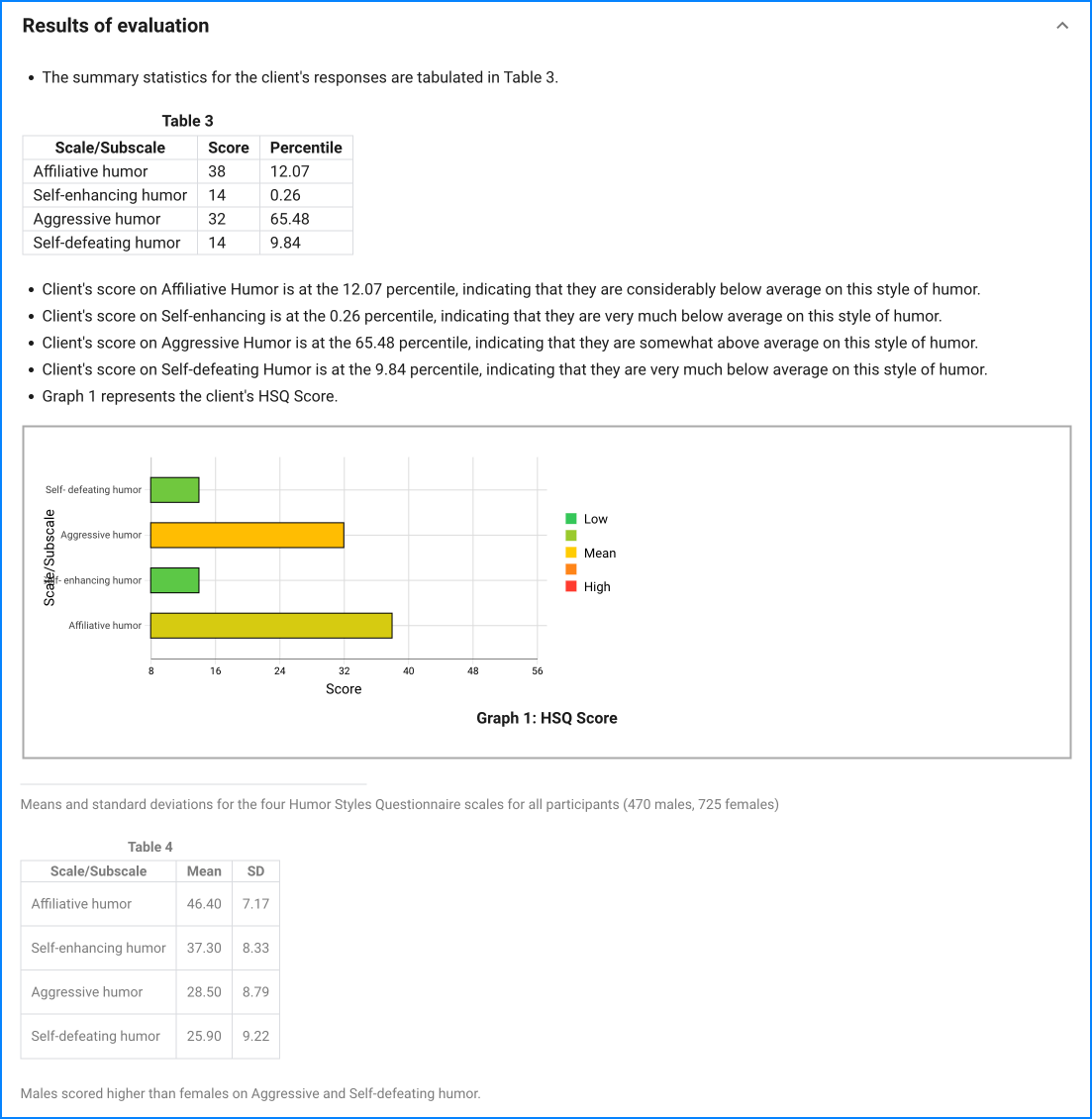Participants respond to the humor items (using a 7-point Likert scale ranging from 1 = totally disagree to 7 = totally agree).
Reverse keyed items - 1,7,9,15,16,17,22,23,25,29,31
Subscales
Start delivering measurement based mental health care
Conduct psychological assessments remotely, get scores automatically, and maintain clinical records securely
Create account

The Humor Styles Questionnaire (HSQ) assesses four dimensions relating to individual differences in uses of humor. These are: relatively benign uses of humor to enhance the self (Self-enhancing) and to enhance one's relationships with others (Affiliative), use of humor to enhance the self at the expense of others (Aggressive), and use of humor to enhance relationships at the expense of self (Self-defeating). The Humor Styles Questionnaire represents a new approach to measurement of individual differences in humor, in that it is the first self-report measure to specifically assess ways in which people use humor that are less desirable and potentially detrimental to psychological well-being (Aggressive and Self-defeating humor).
You can create a free account on PsyPack to access fillable PDFs, manuals and educational resources for the HSQ
Participants respond to the humor items (using a 7-point Likert scale ranging from 1 = totally disagree to 7 = totally agree).
Reverse keyed items - 1,7,9,15,16,17,22,23,25,29,31
Subscales
Means and standard deviations for the four Humor Styles Questionnaire scales for all participants (470 males, 725 females)
| Scale/Subscale | Mean | SD |
|---|---|---|
Affiliative humor | 46.40 | 7.17 |
Self-enhancing humor | 37.30 | 8.33 |
Aggressive humor | 28.50 | 8.79 |
Self-defeating humor | 25.90 | 9.22 |
Males scored higher than females on Aggressive and Self-defeating humor.
PsyPack can automatically score the HSQ assessment and prepare corresponding tables and graphs.

Humor, Coping, Personality, Well-being
The purpose of the evaluation is to:
Self-administered
Positive psychology
Questionnaire
Adolescence to old age
About 5 minutes
As is true of any self-report instrument, respondents can consciously distort their response to the scale if they are motivated to do so.
The Humor Styles Questionnaire (HSQ) focuses on the interpersonal and intrapsychic functions that humor is made to serve by individuals in their everyday lives, and particularly those functions that are considered most relevant to psychosocial well-being.
The HSQ assesses two dimensions of humor (Affiliative and Self-enhancing humor) that are positively related to psychosocial health and well-being and two dimensions (Aggressive and Self-defeating humor) that are negatively related to these variables. Absence of certain detrimental styles of humor may be important to psychosocial well-being, and presence of more beneficial humor styles seem to enhance coping and well-being.
Men score substantially higher than women on both of the potentially detrimental humor scales (but not the two scales measuring presumably more benign humor uses).
Martin, R. A., Puhlik-Doris, P., Larsen, G., Gray, J., & Weir, K. (2003). Individual differences in uses of humor and their relation to psychological well-being: Development of the Humor Styles Questionnaire. Journal of Research in Personality, 37(1), 48–75. https://doi.org/10.1016/S0092-6566(02)00534-2